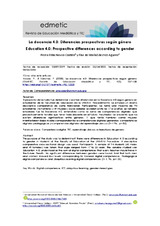La docencia 4.0: Diferencias prospectivas según género
Education 4.0: Prospective differences according to gender
Autor
Novoa Castillo, Pedro Félix
Sánchez-Aguirre, Flor de María
Editor
UCOPressFecha
2020Materia
Competencia digitalTIC
Aprendizaje ubicuo
Estereotipos de género
Digital competence
ICT
Ubiquitous learning
Gender stereotypes
METS:
Mostrar el registro METSPREMIS:
Mostrar el registro PREMISMetadatos
Mostrar el registro completo del ítemResumen
El propósito del estudio fue determinar si existían diferencias en la Docencia 4.0 según género en estudiantes de la Facultad de Educación de la UNMSM. Procedimiento: Se empleó un diseño descriptivo comparativo de corte transversal. Participantes: Se tomó una muestra de 94 estudiantes (45 hombres y 49 mujeres); cuyas edades oscilaron entre los 17 a 25 años. La variable estudiada fue la Docencia 4.0, entendida como la suma de competencias digitales que proyectivamente tendría que tener todo docente en el futuro. Resultados: Se encontró que no existen diferencias significativas entre géneros. Y que tanto hombres como mujeres manifestaban bajos niveles correspondientes a competencias digitales generales, competencias digitales pedagógicas y competencias digitales del aprendizaje ubicuo (Z>-1,96., p>.05). The purpose of the study was to determine if there were differences in Education 4. 0 according to gender in students of the Faculty of Education of the UNMSM. Procedure: A descriptive comparative cross-sectional design was used. Participants: A sample of 94 students (45 males and 49 females) was taken; their ages ranged from 17 to 25 years. The variable studied was Education 4. 0, understood as the sum of digital competences that every teacher should have in the future. Results: No significant differences between genders were found. And that both men and women showed low levels corresponding to General digital competences, Pedagogical digital competences and Ubiquitous learning digital competences (Z>-1, 96., p>; 05).

